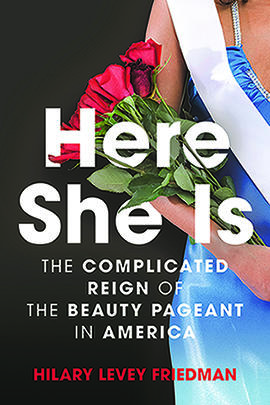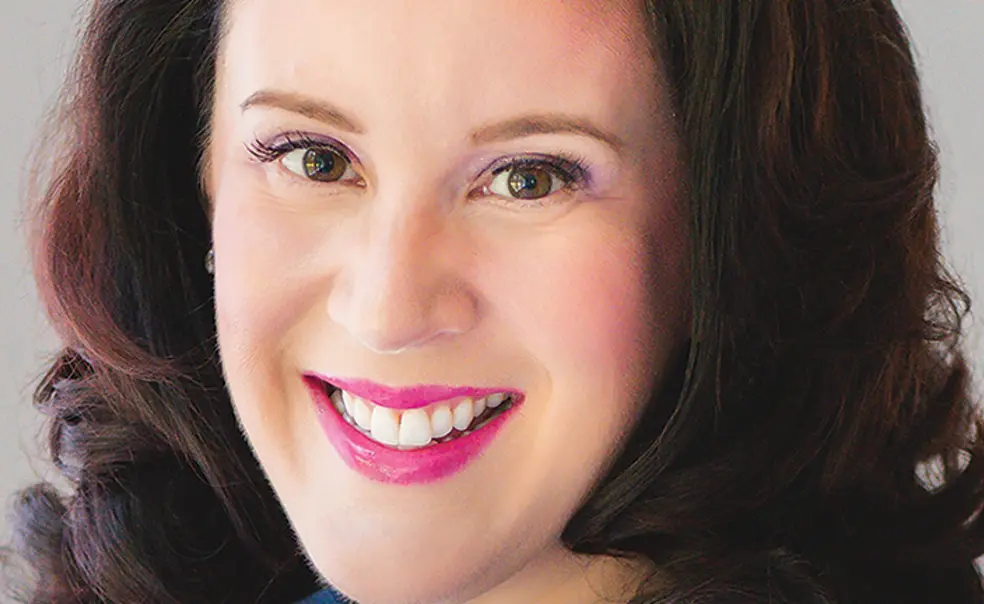Hilary Levey Friedman *09 Studies the Sociology of Beauty Pageants
Why do moms put their young daughters in child beauty pageants?

That personal and professional history inspired Here She Is: The Complicated Reign of the Beauty Pageant in America (Beacon Press), tracing the relationship between beauty pageants and American feminism. “It just really felt like a book that I needed to write,” Friedman says. Friedman doesn’t deny the role of pageants in objectifying women, but she writes that she nevertheless has “come to see Miss America as possibly the best example of the difficult and complicated nature of American womanhood.”
What was the impact of having a former Miss America as your mother?
When I was growing up, it really loomed large. It made me want to go out and forge my own path. That changed a little bit, because in my sophomore year of college, shortly after the JonBenét Ramsey murder, I discovered sociology as a discipline. We needed to do a project about some question in society. Mine was: Why do moms put their young daughters in child beauty pageants? At the time, I didn’t think this was some subconscious way to stay connected to my mom. Looking back, I can see that was my first attempt to try to reconcile my notions about beauty and brains. Growing up, I thought those were mutually exclusive. I definitely no longer believe that is true.
The book seems to reflect some ambivalence about beauty pageants.
Like many things in life, beauty pageants are not all good and they’re not all bad — it’s how you decide to use it in your life. There are skills that women can learn by competing in beauty pageants. We shouldn’t say that these women who compete are cultural dupes. Think about someone like Gretchen Carlson [Miss America 1989 and a past board chair of the competition], undoubtedly one of the most successful women in media and in the social movement around sexual harassment.
You’re a pageant judge and you’re also the president of the Rhode Island chapter of the National Organization for Women. That seems complicated.
To me, what it comes down to is that the feminist movement is about choice. I would never dismiss someone based on how they look — either because they’re too girly or not girly enough. To me these things are just not mutually exclusive, especially today.
What do feminism and beauty pageants owe one another?
Certainly there’s a symbiotic relationship. Beauty-pageant contestants wear sashes very similar to what the suffragettes wore. The suffragettes really paved the way for women to be out in public. We see the pageants in some ways co-opting the platform of the First Wave feminists. For Second Wave feminism, the feminists co-opted that very large platform the Miss America pageant had built in order to advance and amplify their own message about women’s rights.
What was the biggest challenge in writing Here She Is?
This is a subculture that at times can be very closed off, and that’s especially true in child beauty pageants. But also, because there has been a lot of tumult and drama around the Miss America program the past few years, getting access, even for someone like me who has relationships, was challenging.
It’s surprising to learn that Gloria Steinem competed in an Ohio beauty pageant.
Beauty pageants offered women an opportunity for social mobility, an opportunity to access funds for education.
Beyond sexism, pageants have a history of other “isms” — racism, ableism, homophobia. To what extent do these issues still trouble pageants?
They absolutely still haunt. Obviously, there are more women of color who have won. Still, though, a woman who identifies as Latinx has never won the title of Miss America. In terms of homophobia, that’s probably the one first that has not happened in any of the major pageants yet — that someone competes as an “out” lesbian [and wins]. Ableism is still an issue. There has been a deaf Miss America. The first woman with a major physical disability to compete at one of the big pageants was at Miss USA — and it was when Donald Trump owned it. She got special permission to have an escort on stage.
Your book also describes an array of other, less prominent pageants.
Let’s take Miss Black America as an example. The point was not to say that women’s beauty didn’t matter. They just wanted to say that black women’s beauty is beautiful as well. There are ethnic pageants that celebrate beauty in a different way. Miss Navajo includes a cooking competition and being able to speak the language.
Is Miss America — or beauty pageants in general — past its prime?
I don’t think pageantry is past its prime, because we see it in all kinds of new ways today. I just finished watching RuPaul’s Drag Race All Stars. The winner gets a crown and a scepter. That’s certainly a new form of pageantry. But I do have concerns about Miss America and its longevity. I think there will always be a group of diehard fans who keep it going, but if Miss America’s not on TV, particularly network TV, it doesn’t have the resources to give out the scholarships.
How else have beauty pageants affected the larger culture? The book mentions The Bachelor and Bachelorette franchises.
The Bachelor is basically what Miss America used to be — even down to who used to be the host, Chris Harrison. When you watch the early episodes of each Bachelor season, it’s like a Miss America pageant. Everybody pretty much appears in their swimsuits. And then the Rose Ceremony is like the evening gown [competition]. The links between the marriage market and debutante culture are very evident in both. One of the judges of Miss America 2012 was Mike Fleiss, who came up with The Bachelor and is the executive producer [and married the winner of the Miss America competition he judged].
What about the links between pageantry and politics?
The skills that many politicians need to be successful are skills that a woman can develop by doing these pageants. That includes speaking in public and being good with the media, and having a platform and a story. It used to be Miss Americas would marry politicians. But now they want to be the politician.
Interview conducted and condensed by Julia M. Klein












No responses yet